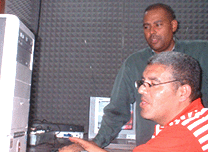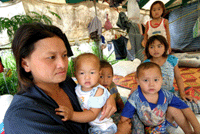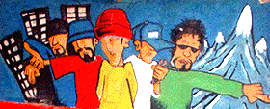
Search Results for site


Taking Notes in Oaxaca, Mexico
"What we manage to do each time we win a victory is not so much to secure chance once and for all, but rather to create new terrains for struggle." -Angela Davis, from Abolition Democracy
Oaxaca is wide awake. While many of us seem to be in a deeply unconscious state, oblivious to the world’s realities of violence, exploitation and oppression, the people of Oaxaca are rising up. Tired of their historical suffering under policies of domination, the people have organized a liberation movement that is opening eyes around the world. The movement in Oaxaca is a current, inspiring demonstration of popular power, and although every people’s struggle must create its own path, Oaxaqueños are offering us valuable lessons about organization, solidarity, and resistance.

From a Jail to a Community Radio Station: Revolution in Venezuela Made Tangible
The neighborhood of El 23 de Enero is like many improvised neighborhoods in Caracas clinging to the hillsides of the city; multi-colored apartments made of brick and cement were stacked on top of each other forming labyrinth-like alleyways and streets. One of many barrios in Caracas, the community was self-assembled by immigrants from the countryside, most of whom began by squatting land on the hills outside the center of the city, and assembling houses next to and on top of each other.

Oily footprints on the path to 9/11
As troops and planes headed toward Afghanistan in October 2001, few people questioned the reasons for military engagement.

The Hmong: An Uncertain Future in Thailand
Thailand's Internal Security Operations Command (ISOC) was recently assigned the task of repatriating 4,500 ethnic Hmong living in Phetchabun province-and they were told by caretaker Prime Minister Thaksin Shinawatra to find a solution to the problem as soon as possible. Unfortunately, in this case, a 'quick fix' just isn't feasible.

Rapping in Aymara: Bolivian Hip Hop as an Instrument of Struggle
At 13,000 feet, the hip hop movement in El Alto, Bolivia is probably the highest in the world. The music blends ancient Andean folk styles and new hip hop beats with lyrics about revolution and social change. As the sun set over the nearby snow capped mountains, I sat down with Abraham Bojorquez, a well known El Alto hip hop artist. We opened up a bag of coca leaves and began to talk about what he calls a new “instrument of struggle.”
We were at Wayna Tambo, a radio station, cultural center and unofficial base of the city’s hip hop scene. Bojorquez pulled a leaf out of the bag to chew and said, “We want to preserve our culture through our music. With hip hop, we’re always looking back to our indigenous ancestors, the Aymaras, Quechuas, Guarani.” He works with other hip hop artists in El Alto to show “the reality of what is happening in our country. Through our lyrics we criticize the bad politicians that take advantage of us. With this style of hip hop, we’re an instrument of struggle, an instrument of the people.”
